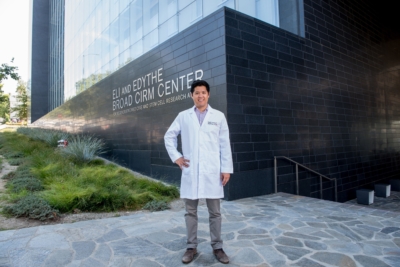Justin Ichida has been named the John Douglas French Alzheimer’s Foundation Associate Professor of Stem Cell Biology and Regenerative Medicine at USC. This new endowed professorship recognizes Ichida’s progress in developing stem cell-based approaches to studying neurodegenerative diseases including ALS, frontotemporal dementia, and Alzheimer’s disease.
“Alzheimer’s disease affects more than 50 million people worldwide, and this number is expected to triple by 2050,” said Cheryl Mae Craft, who is the president and CEO of the John Douglas French Alzheimer’s Foundation, as well as a professor of Ophthalmology and Integrative Anatomical Sciences at the Keck School of Medicine of USC. “Given this truly staggering burden of disease, the foundation made a strategic decision to endow 10 professorships at top California research universities for scientists studying Alzheimer’s disease and related neurodegenerative conditions. One of these remarkable scientists is Dr. Justin Ichida at the Eli and Edythe Broad Center for Regenerative Medicine and Stem Cell Research at USC.”
Andy McMahon, the director of USC’s stem cell research center, added: “I am delighted the John Douglas French Alzheimer’s Foundation is investing in Justin Ichida, a terrific scientist with an unusual breadth in his interest in neurodegenerative disease.”
The Ichida Lab uses a stem cell-based approach to create patient-specific models of human neurodegenerative diseases in the laboratory. To accomplish this, the lab takes small skin or blood samples from patients with Alzheimer’s disease, ALS, and other neurodegenerative conditions. The lab then reprograms these skin or blood cells to become disease-relevant cell types such as neurons. These patient-specific neurons are useful for understanding the cellular and molecular underpinnings of disease, and for screening thousands of potential drugs to slow or stop neurodegeneration.
In 2017, the foundation provided a $100,000 gift to enable the Ichida Lab to use their reprogramming approach to generate immune cells called microglia, which scavenge and remove tangled proteins and plaques from the brain. The lab is testing whether these microglia stop scavenging in response to some of the genetic changes associated with Alzheimer’s disease.
Ichida will continue this scientific progress as one of 10 newly endowed professors and research programs at USC, UCLA, UC San Francisco, and UC Santa Barbara. United by their commitment to finding new ways to treat Alzheimer’s disease, these 10 endowed professors and their teams will meet for an annual consortium to share research progress and foster collaborations.
Since 1983, the foundation has invested more than $2.5 million in scientific research at USC, and $40 million total in support of discoveries advancing the treatment, prevention and cure of Alzheimer’s disease at research institutions across the U.S. Their most recent gifts honor the memory of their founder, Dorothy Kirsten French, and Michael Minchin, Jr., who recently passed away while serving for 20 years as the foundation’s president and CEO.
“I’m honored to be the first John Douglas French Alzheimer’s Foundation Associate Professor of Stem Cell Biology and Regenerative Medicine at USC,” said Ichida, who is also a New York Stem Cell Foundation-Robertson Investigator. “The support from the foundation has been instrumental in enabling our lab to expand our research into the area of Alzheimer’s disease. The suffering caused by this disease is immense, both in terms of each patient’s experience and the sheer number of people and families affected. I am optimistic that our stem cell-based approaches will uncover new therapeutic strategies for Alzheimer’s patients.”
— by Cristy Lytal
